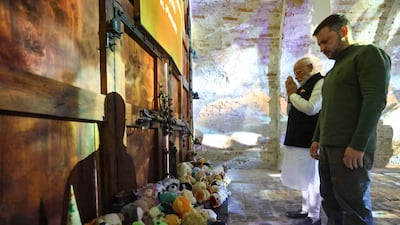Indian Prime Minister Narendra Modi urged Ukraine's President Volodymyr Zelenskyy to negotiate with Russia when he visited Kyiv on Friday.
In the first visit by an Indian Prime Minister since Ukraine gained independence in 1991, Mr Modi offered to act as a “friend” to facilitate talks between the nations who have been at war for almost two and a half years.
“The road to resolution can only be found through dialogue and diplomacy,” Mr Modi said. “And we should move in that direction without wasting any time. Both sides should sit together to find a way out of this crisis.
“I want to assure you that India is ready to play an active role in any efforts towards peace. If I can play any role in this personally, I will do that, I want to assure you as a friend.”
The meeting came six weeks after Mr Modi met Russian President Vladimir Putin in Moscow, which Mr Zelenskyy said had dealt a “devastating blow to peace efforts”.
The same day, Russian bombing killed at least 41 people, including at a children's hospital in Kyiv, leading to global outrage over Moscow’s military aggression against Ukraine.
It was not immediately clear how Ukrainian officials responded to Mr Modi's offer to mediate. Both leaders called his visit, following a 10-hour overnight journey on the Ukrainian Rail Force One train, “historic”.
Together they honoured the memory of children killed in the war with Russia, which began in February 2022, at the Martyrologist Exposition.
“I was deeply hurt today when I visited [the Martyrologist Exposition] on children at the National Museum of History,” Mr Modi said. “I feel that innocent children are the first casualties of war.”
The Indian Prime Minister, 73, was pictured with his hand on 46-year-old Mr Zelenskyy's shoulder as they viewed images of children killed.
More than 10,000 civilians and 30,000 Ukrainian soldiers have been killed in the war that entered its 912th day on Friday. More than 20,000 people have been injured, according to UN Human Rights Monitoring Mission in Ukraine.
Mr Modi and Mr Zelenskyy later held bilateral talks at Mariinsky Palace, the official residence of the Ukrainian President.
They also signed four agreements on co-operation in agriculture, the food industry, medicine, culture and humanitarian assistance, officials said.
India’s External Affairs Minister Subrahmanyam Jaishankar said Mr Modi had stressed “India's willingness to contribute in all ways possible”.
“The Prime Minister also discussed his conversation with Russian President Vladimir Putin,” Mr Jaishankar told the media.
“It is India's view that the two sides need to engage with each other to find a solution.”
Commentators say Mr Modi’s visit is an attempt by New Delhi to placate its western partners, who have failed to push India to condemn Moscow over its military campaign in Ukraine.
India is a long-time partner of Russia, and New Delhi has sought to continue its relationship with Moscow despite the US and western countries urging nations to sever ties and threatening sanctions for trade relations in some sectors.
India has repeatedly abstained from voting on the western-backed resolutions at the UN.
“Developing countries, including India, are adversely impacted in a big way. Therefore, ending this conflict is important. That is what Mr Modi will try to do,” Anil Trigunayat, a former Indian diplomat, told The National.
Mr Trigunayat said Mr Modi’s privileged relationship with Mr Putin and his talks with the president could contribute to a ceasefire.
During his meeting with Mr Putin, Mr Modi had emphasised “peace through talks” saying that “solutions are not possible on the battlefield”.
“India has a special and privileged strategic partnership with President Putin and India has not condemned Russia and [has] maintained contacts, so they understand India has a special position,” Mr Trigunayat said.
“Mr Modi met Zelenskyy first, and the European, American leaders. Then he met Putin, and now he's going to talk to Zelenskyy finally.
“There is war fatigue on both sides. Maybe he'll come up with some solution, or an idea he can give on the basis of which some kind of a negotiation can happen, and possibly a ceasefire,” Mr Trigunayat said.


